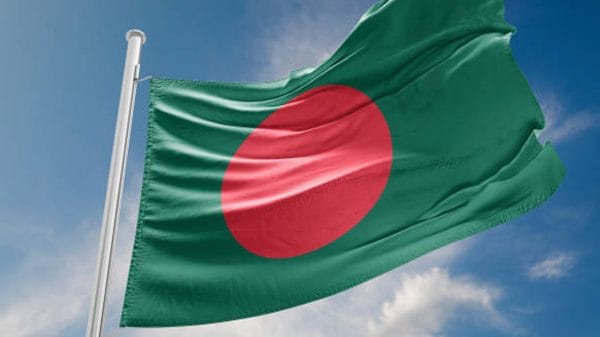Thank you dear subscribers, we are overwhelmed with your response.
Your Turn is a unique section from ThePrint featuring points of view from its subscribers. If you are a subscriber, have a point of view, please send it to us. If not, do subscribe here: https://theprint.in/
Genesis:
A quick recap. 21st February was designated by United Nations as the International Language Day in 1999. The run-up looks like this:
In 1948, Muhammad Ali Jinnah, the Founding Father of Pakistan, made his first visit to East Pakistan. And imposed Urdu as the National Language. The Bengalis refused to accept the dictate and started to agitate.
It reached a flashpoint on 21st of February 1952, when the Pakistani Army fired at the agitating students of Dhaka University. Bodies fell and blood of young students flowed on the streets. The entire East Pakistan blew up in flames. The day, 21st February, since then became historic as ‘Ekushe’, meaning 21st in Bengali, and remains the flagstone of Language Agitation.
Eventually, in 1971, with the military help from India, East Pakistan ceded from Pakistan. Bangladesh was born, riding on the waves of the language agitation.
Another 28 years later, in 1999, United Nations designated 21st February as International Language Day, in recognition of the language struggle of Bangladesh.
Is Bangladesh Forsaking Leadership?
Bangladesh has since then been the flagbearer of International Language Day.
Currently, Bangladesh is going through political turmoil. But this isn’t something new. It has seen military dictatorships, clampdowns on democracy, and questionable elections in its fractured political journey.
However, a different hue is making its presence felt for the first time. Is the primacy of its identity tilting away from its language, Bengali, to its religion, Islam? Back to 1947?
The chatter is, this year, the Language Day celebrations on 21st February lacked the pomp and splendour of previous years. Though Dr Yunus and others in government did speak on the occasion, but the fervour of the past was missing. Further, Urdu, which was denied an inch of space all these years (I have experienced firsthand over years of my visits), is creeping back through the ulema and intelligentsia favourable to the current rulers.
In the discussions in Bangladesh’s television channels, one can now hear elements undermining the language agitation of their independence movement. This was unthinkable in the past.
Is Bangladesh giving up its leadership – championing the cause of mother tongue across the world? Only future will tell.
India’s Language Conundrum:
In India, the ‘language issue’ rears its satanic head with unfailing regularity. As is happening now over NEP. For more than one reason, using language for politics or policy is playing with fire. By both the sides. Let me explain, why.
Not Fungible:
You can change your nationality or your religion – two of the most emotive identities of humans. But if born to a particular linguistic community, that identity is not fungible.
However much one speaks fluently in English, espouse another faith, settle in another country, a Tamilian or a Punjabi never ceases to be her own linguistic self. That’s a given. For life.
History within our lifetime shows that this concrete coupling with one’s linguistic identity is often underestimated, especially by those in power. In the Pakistan of 1971, dominant Punjabis of West Pakistan underestimated it about their Eastern Bengalis. In Sri Lanka, the Sinhalese underestimated about their Tamil counterpart. Both burnt a lot more than their fingers.
Contrast these with Singapore, which officially embraced the languages of their minorities, of Tamilians and the Malay people.
Is India not Learning?
India’s first major language-flashpoint happened in 1965. People in Tamil Nadu rejected the imposition of Hindi with violent protests. The then rulers from Delhi withdrew their ruling. But the surrogate efforts remained. ‘Hindi Diwas’ is celebrated in all Public Sector Units across the country.
I (a linguistic minority, a Bengali, living in Bangalore) must admit that Hindi seems to be the natural link language in the plurality of India. I spoke Hindi during my visits to Manipur and Gujarat, Assam and Kashmir. But this is not due to any government policy. Rather, over the decades, Lata Mangeshkar, a Marathi, Rajesh Khanna, a Punjabi, and their ilk had more to do with spreading of Hindi across non-Hindi speaking swathes of the country.
However, whenever Hindi was promoted, directly or by proxy, through governmental intervention, real or imagined, it resulted in backlash. People are suspicious of government’s intentions and politicians of all sides jump in to take advantage.
All these make me think, the cause of Hindi has been repeatedly hurt by the zealous Hindiwalas and the governments. Left to the people, Hindi would be more acceptable across the disparate linguistic plurality of India.
Ashis Dutta is a Bangalore based software entrepreneur, writer and author of Gandhi and the London Cabby. Can be reached at connectwithashis@gmail.com
These pieces are being published as they have been received – they have not been edited/fact-checked by ThePrint.


